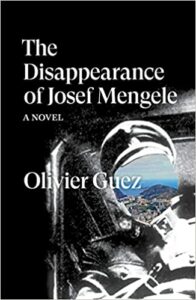The ten people from history I’d most like to have dinner with? I have no idea, but at the top of my list of those I don’t want to dine with? Josef Mengele, the so-called “Angel of Death,” a Nazi doctor who sent 400,000 to their deaths at Auschwitz and used humans for hideous medical experiments. I’m a Jew and a twin so I tend to opt out of social engagements with people eager to murder and dissect me.

The novel sticks closely to the facts, using Mengele’s diaries to imagine his thoughts, and hewing closely to recorded conversations and documents. The book begins with Mengele’s arrival in Argentina, a country open to war criminals, thanks to Argentinian president Juan Perón, who is eager for German scientific knowledge to help build infrastructure in his country. After a brief period of manual labor that he abhors, Mengele lives a comfortable life: semi-out in the open, socializing with those who frequent the offices of the fascist Der Weg, a far right magazine published in Buenos Aries from 1947-1957. Mengele also performs underground abortions and works as a salesman for his father’s farm equipment company, which is still flourishing back in Germany. In the novel, we learn that Mengele appeared to disdain most of those he meets. Not surprisingly, given the Jews and Gypsies he has murdered, he is an unrepentant racist, as disclosed by his son. He is also a classist who hates his own brother—and is, in fact, delighted when he learns of his brother’s death. Mengele doesn’t even like Adolf Eichmann. He decides, after meeting the “architect of the Holocaust” in Argentina, that “Eichmann is a pathetic creature, a failure of the highest order.” As for Perón, Mengele thinks that the leader fails to “act with brutality because he is mired in all that Judeo-Christian nonsense such as compassion and pity – all those forms of sentimentalism – which Nazism has eliminated.”
Arrogant and with a sense of his own invincibility, this imagined Mengele finds his fortunes abruptly changing after he is accused of playing a part in a botched abortion that results in a teenage girl’s death. The press coverage makes him flee to Paraguay, and from then on, he lives entirely undercover and with increasing paranoia, given attempts (from Germany, Israel, and America) to find and prosecute him. He complains bitterly about his circumstances, managing (as so many victimizers manage) to cast himself as a victim. How terrible the Jews have been to him! How unappreciated he is! The only time Mengele appears to grieve is when he receives the “terrible news” that his German degrees in medicine and anthropology have been rescinded. Otherwise, he lives in Argentina, Paraguay, and ultimately Brazil, as he lived before—with no compassion for other human beings, though with a real interest in a cockroach-like bug that he comes to study with an intense scientific method. That he is able to survive is thanks to his rich father, always sending money to maintain his son’s living situation, and to the fellow Nazis, who deliver the funds to him and find places for him to live.
At 213 pages, The Disappearance of Josef Mengele isn’t a long book, but it shoehorns in an enormous amount of history—about Mengele’s education, his activities at Auschwitz, and his experiences in South America, as well as details of Juan and Evita Perón’s lives, the many enablers who helped Mengele hide. It also has intriguing information about Israeli intelligence efforts to capture him, the misguided rumors about his supposed location, and his antics while in hiding. At times, the book, though lucid, has the density of an actual book of history, which it closely resembles, given how Guez adheres to facts, using existing sources to try to imagine how Mengele might have thought in a given situation. Originally published in 2017, and awarded France’s Prix Renaudot for outstanding original novel, the book was released by Verso in 2022, in an English translation by Georgia de Chamberet.
Edmund Burke famously said, “All that is necessary for the forces of evil to win in the world is for enough good men to do nothing.” There aren’t really any good men (or women) in The Disappearance of Josef Mengele —just one evil man, his fellow Nazis, and some greedy people too concerned about their own situations to report him. Thankfully, though, there is the author himself, a writer who accurately depicts both history and the lopsided thinking that leads to its horrors, to make sure readers remember.
Debra Spark’s fifth novel, Discipline, will be published in March 2024. She teaches at Colby College in Maine.






